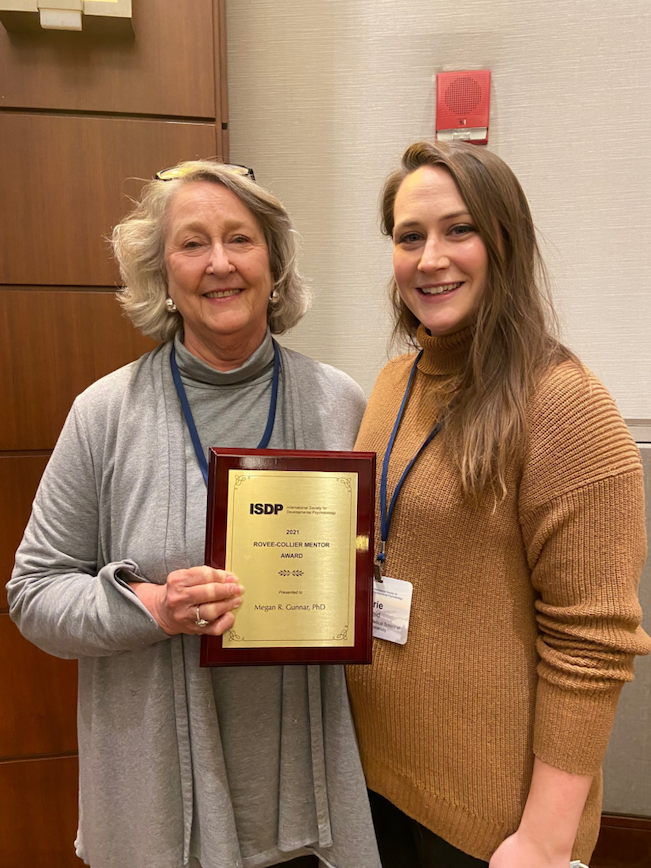Megan Rosamond Gunnar, PhD
Institute of Child Development
Associate Director, Center for Neurobehavioral Development
Adjunct Professor of Child and Adolescent Psychiatry
University of Minnesota, Minneapolis, Minnesota USA
https://innovation.umn.edu/gunnar-lab/
https://icd.umn.edu/people/gunnar/
@GunnarMegan

Dr. Gunnar embodies all the qualities this award represents. Her tireless dedication to all students, throughout the decades, remains a model for faculty in the International Society for Developmental Psychobiology and beyond. Dr. Gunnar is no stranger to receiving recognition for her contributions to education and mentoring. She held the Rodney Wallace Professorship for the Advancement of Teaching and Learning from 2002-2005 and, in 2014, received the Mentor Award for Lifetime Achievement from the Association of Psychological Science (APS). Outside of Dr. Gunnar’s singular impacts on the study of stress reactivity development in children with her research achievements, Dr. Gunnar has made incredible impact on ISDP and the field through the achievements of her many students who have gone on to establish large and highly productive careers. Dr. Gunnar’s mentorship has produced a new generation of interdisciplinary scientists focused on understanding the role of early adverse environments on human psychobiological development. As the letters accompanying the nomination made clear, Dr. Gunnar’s zeal for mentoring has enabled her students excel. Her concern for her students’ intellectual and personal growth extends well beyond the graduation date, being available and always keeping an eye for how she can best connect and facilitate her mentee’s careers and science. Dr. Gunnar, both as the current President of ISDP and a dedicated member since 1978, exemplifies mentorship of young scholars in ISDP and beyond. She furthers her students’ careers, in part, by making sure they have publications. Of the 126 publications produced in the last decade, 91 (72%) included student authors. 83% of those student-author publications have the student as the first author. This pattern was also prevalent earlier in her career. Although she no longer tracks conference presentations, the same pattern holds there. She describes ISDP as nurturing her career since she was a postdoctoral student in Gig Levine’s lab, and in her ISDP election statement reaffirmed her commitment to continue ISDP’s strong support for young students, postdocs, and junior faculty. One only needs to attend the ISDP annual meeting to get a sense of the influence Dr. Gunnar’s mentorship: it is not uncommon to see many of her current and former mentees presenting everything from undergraduate research posters to chairing symposia.
Biography
Megan R. Gunnar is a Regents Professor, Distinguished McKnight University Professor, and a member of the Academy of Distinguished Teachers. She received her Ph.D. in Developmental Psychology at Stanford University in 1978 and then completed a post-doctoral fellowship in Psychoneuroendocrinology at Stanford Medical School. In 1979 she became an assistant professor of developmental psychology at the University of Minnesota, moving through the ranks to full professor in 1990. Professor Gunnar has spent her career studying how stress biology affects human brain and behavioral development and the processes that help children regulate stress and emotions. She is a recipient of lifetime achievement awards from the American Psychological Association, the Society for Research in Child Development, the Association for Psychological Science, and the International Society for Psychoneuroendocrinology. She is also a member of the American Academy of Arts and Sciences and the National Academy of Education. Professor Gunnar has an active research group with six paid staff and multiple graduate students. Teaching, mentoring students and conducting research are her passions, along with babysitting grandchildren. Professor Gunnar is involved in many activities to translate research on early development for use by policy makers, practitioners and families including serving as a founding member of the Harvard Center on the Developing Child’s National Scientific Council. Finally, she serves on the boards of Think Small and the Greater Minneapolis Crisis Nursery and is on the Advisory Council to Children’s Cabinet for the State of Minnesota.
Lab
The Gunnar Laboratory for Developmental Psychobiology Research
Research
My lab studies how children and adolescents regulate stress and emotions. Two issues currently motivate most of our work.
First, we know that during infancy and childhood attachment relationships are powerful regulators of the child’s stress system. Regulation of the stress system by the parent-child attachment relationships appears to become less effective in adolescence. Furthermore, this shift in effectiveness is associated more with pubertal stage than age, and we find that friends do not simply take over for parents as social buffers of stress. We are currently working on an imaging paradigm to help us explore how the changes in social buffering during the peripubertal period relate to changes in brain activation patterns during stressors.
Second, we have found that children who did not have the opportunity to form stable attachment relationships early in life (i.e., those adopted from orphanages) also fail to be able to use the parent-child relationship to regulate stress during childhood. Such children also show atypical patterns of stress activity in anticipation of threat. However, for these children puberty, being a period of heightened neural plasticity may open a window of opportunity to recalibrate the stress system. Thus we are examining the role of puberty in interaction with current psychosocial stress conditions in shaping stress reactivity and regulation in both youth with a history of deprived care (orphanage-adopted children) and children reared in their families of origin.
Carolyn Rovee-Collier (April 7, 1942 – October 2, 2014) was a Professor of Psychology at Rutgers University. She was a pioneer and an internationally renowned expert in cognitive development. Over the course of her distinguished career, Carolyn received numerous honors and awards including the Senior Scientist Lifetime Contribution Award from the International Society for Developmental Psychobiology. She was elected to The Society of Experimental Psychologists in 1999 and received that society’s prestigious Howard Crosby Warren Medal in 2003. Carolyn received a James McKeen Cattell Fellowship, a Medal for Distinguished Achievement from the Brown University Graduate School, and the biannual Award for Distinguished Scientific Contributions to Child Development from the Society for Research in Child Development. Her oral history has been recorded and placed in the public archive of The Society for Research in Child Development’s Oral History Project. Carolyn’s research on infant learning and memory received continuous NIH funding for over 35 years, including an NIMH MERIT Award and two successive NIMH Research Scientist Awards. She served for 18 years as Editor of Infant Behavior & Development in addition to serving as co-editor (with Lipsitt) of Advances in Infancy Research (Vols. 3–12), President of the International Society for Developmental Psychobiology, the International Congress of Infant Studies and the Eastern Psychological Association.
Carolyn was also a firm believer in serendipity. Her hallmark task, the mobile conjugate reinforcement paradigm, was developed as a means to settle her own fussy infant. While trying to write her dissertation, Carolyn used a hair ribbon to connect her son’s ankle to his overhead mobile. She stood by her son’s crib and watched as he quickly learned to control both the rate and vigor of the mobile’s movements by altering his foot kicks. Her first publication (Rovee & Rovee, 1969) set the stage for the uphill scientific battle that would dominate her career. Her demonstration of operant conditioning by very young human infants flew in the face of traditional Piagetian theory. Despite her rigorous experimental methods, it took years to get that paper published. Her subsequent work on infant long-term memory (Rovee & Fagen, 1976; Rovee-Collier, Sullivan, Enright, Lucas, & Fagen, 1980) was similarly controversial because it was inconsistent with the prevailing view that infant memory was poor. Her theoretical work presents a direct challenge to current neural models of memory development (Rovee-Collier & Giles, 2010; Rovee-Collier, Hayne, & Colombo, 2001).
Above all else, Carolyn was highly committed to training graduate students and other emerging researchers. Over the course of her career, she mentored dozens of PhD, master’s, and undergraduate research students. She taught them everything that they needed to know to succeed in their careers — for example, that spelling counts, and that just because a reviewer (or an editor) says something doesn’t make it so. Most importantly, she taught them that some battles are definitely worth fighting. Like any great coach, Carolyn pushed people to their limits, but she never asked more from others than she was willing to do herself. She was always the first person in the lab in the morning and the last one to leave. Working with Carolyn was a cross between boot camp and a luxurious bed and breakfast: She might keep you up working for 2 to 3 nights in a row, but during that time, she generously provided ample amounts of home cooking and southern hospitality. For those of us who had the privilege of working with her, Carolyn Rovee-Collier was always our staunchest critic and our fiercest ally. Speaking on behalf of her students, her postdocs, her colleagues, and her friends, it is safe to say that we all drew an immeasurable degree of personal and professional strength knowing that Carolyn was in our corner. The Carolyn Rovee-Collier mentorship ISDP Award celebrates this level of support in other exceptional ISDP mentors.
Rovee-Collier Mentor Award Winners:
- 2021 Rovee-Collier Mentor Award: Megan Gunnar, PhD
- 2020 Rovee-Collier Mentor Award: Martha Ann Bell, PhD
- 2019 Rovee-Collier Mentor Award: Joanne Weinberg, PhD
- 2018 Rovee-Collier Mentor Award: Ruth Grunau, PhD
- 2018 Rovee-Collier Mentor Award: William P. Fifer, PhD
- 2017 Rovee-Collier Mentor Award: George F. Michel, PhD


